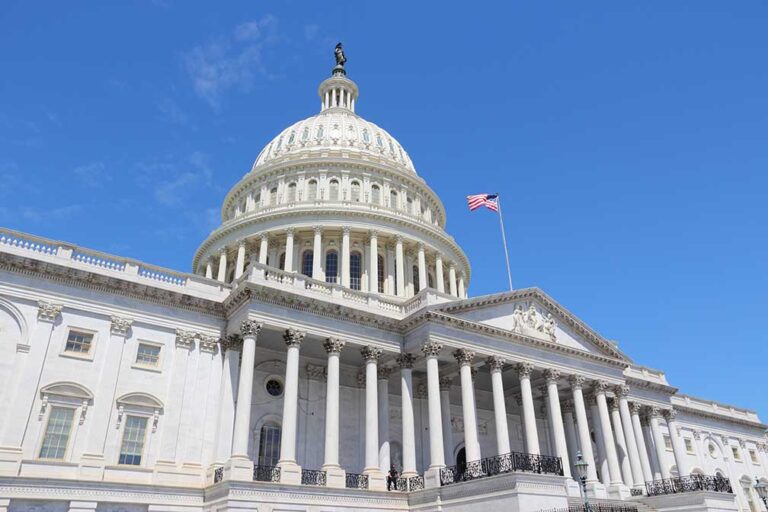The U.S. House Committee on Transportation and Infrastructure on Sept. 15 advanced transportation and climate legislation that would invest nearly $60 billion in America’s infrastructure. As of this writing, a date had not been set for the full House to vote on the measure.
Meanwhile, Democratic leaders are praising the bill as a means for reducing carbon emissions, rebuilding America and creating new jobs.
The transportation bill will be included as part of the Democrats’ $3.5 trillion budget reconciliation bill, which President Joe Biden has said is one of his top priorities and key to his Build Back Better plan. Biden has said the United States must rebuild its infrastructure to withstand the nation’s new era of ever-strengthening natural disasters.
Building back as it was before won’t be good enough, the president has said.
But what’s in it for America’s truckers? Not nearly enough, according to several trucking industry groups.
The Owner-Operator Independent Drivers Association (OOIDA) said in a statement that the bill doesn’t address what it calls America’s truck-parking crisis.
“Despite the long history of broad, bipartisan support, numerous government studies and repeated pleas from truck drivers, Democrats on the (House Transportation and Infrastructure) Committee opposed efforts to address trucking’s No. 1 safety concern, the lack of safe parking,” OOIDA President and CEO Todd Spencer wrote. “Truckers likely face another five years of a worsening crisis that jeopardizes their safety on a daily basis.”
David Heller, vice president of government affairs for the Truckload Carriers Association, said TCA isn’t pleased with the bill, either.
“Trucker parking is priority No. 1 for most truckers out there,” Heller said, adding that passing a bill that would make parking easier for big rigs “would go a long way toward making the life of a trucker better. We will continue talking about this issue. Our day will come.”

Rep. Mike Bost (R-Ill.) introduced an amended piece of legislation to the House that would have addressed trucker parking, but it failed.
In a statement to The Trucker, Bost blamed Democrats.
“Growing up in a family trucking business, I am all too familiar with the shortage of safe truck parking options along our nation’s highways,” Bost wrote.
“This is not only a safety concern for truckers, but also for the commuters who share the road with them. I have offered commonsense amendments three times in the House to provide funding to address this problem, and the Democrat majority has blocked them each time,” he continued.
“They have paid lip service to America’s trucking community and claimed to understand their concerns, yet this $3.5 trillion bill includes zero funding for truck parking. Not a penny. It just goes to show that they don’t care about this problem at all.”
The House Committee on Transportation and Infrastructure’s chair, Peter DeFazio (D-Ore.) praised the infrastructure bill, saying in a statement that it tackles climate change, racial and environmental injustices and will work to “build back better after the COVID-19 pandemic.”
“With this legislation, we can reduce carbon pollution from the transportation sector that’s driving the climate crisis and make communities more resilient to extreme weather events,” DeFazio added.
“(We can) connect people with good-paying jobs and affordable housing; address the planning mistakes of the past by reconnecting communities; make meaningful investments to plan for and develop high-speed rail projects; provide more people access to clean water; and make our aviation and maritime sectors greener. I look forward to seeing Congress pass this once-in-a-generation legislation because we can’t afford to squander this opportunity.”
The reconciliation bill proposes:
- $10 billion to support access to affordable housing and enhance mobility for low-income individuals and residents of disadvantaged or persistent poverty communities.
- $4 billion for reduction of carbon pollution in the surface transportation sector—addressing the largest source of transportation greenhouse gas emissions.
- $4 billion to support neighborhood equity, safety, and affordable transportation access, including reconnecting communities divided by existing infrastructure barriers.
- $6 billion to advance local surface transportation projects.
- $1 billion to the Department of Transportation to support projects that develop, demonstrate, or apply low-emission technologies or produce, transport, blend, or store sustainable aviation fuels.
- $500 million to the Federal Emergency Management Agency’s (FEMA) hazard mitigation revolving loan fund program.
- $425 million for grants for the construction, retrofit, technological enhancement, and updated planning requirements of state, local, Tribal, and territorial emergency operation centers.
- $9.5 billion to the Economic Development Administration to provide investments in persistently distressed communities, provide assistance to energy and industrial transition communities, invest in public works projects, and create regional hubs.
- $1 billion to the General Services Administration to invest in high-performance green buildings.
- $1 billion for climate resilient Coast Guard infrastructure.
- $2.5 billion to the Maritime Administration to support more sustainable port infrastructure and supply chain resilience.
- $2 billion to invest in sewer overflow and stormwater reuse projects, as well as a greater federal coast share for projects that serve financially distressed communities.
- $500 million in grant assistance to invest in the backlog of wastewater projects on Tribal lands.
Biden, during a stop in Arvada, Colo., on Sept. 14, said the infrastructure bill is vital toward helping to reduce global warming.
He used the wildfires in California and Hurricane Ida as examples of changing weather patterns affecting the United States. Biden said that reducing carbon emissions is key, adding that he is working with America’s car manufacturers to build more electric vehicles.
Nothing specific to 18-wheelers was mentioned during Biden’s Sept. 14 remarks, however.
Back at OOIDA, Spencer, in his statement about trucker parking, wrote that “addressing the parking shortage would also have supported efforts to reduce carbon emission from the transportation sector. Truck drivers waste approximately 56 minutes per day looking for parking, all the while needlessly burning fuel, emitting carbon and contributing to congestion.
“It’s tough to swallow the fact that in a year when Congress is authorizing hundreds-of-billions of dollars for infrastructure projects and highway safety programs, not a single penny was set aside for truck parking.”
Linda Garner-Bunch has been with The Trucker since 2020, picking up the reins as managing editor in 2022. Linda has nearly 40 years of experience in the publishing industry, covering topics from the trucking and automotive industry to employment, real estate, home decor, crafts, cooking, weddings, high school sports — you name it, she’s written about it. She is also an experienced photographer, designer and copy editor who has a heartfelt love for the trucking industry, from the driver’s seat to the C-suite.












So what else is new? The crappy asses in Washington could care less about truckers. But let the food and hardware items disappear from the shelves and watch how fast they talk about truckers. That so-called idiot that calls himself president could care even less about truckers. He is nothing but a freaking liar.
Truckers should be able to park with the same freedom that the homeless and illegal immigrants have.